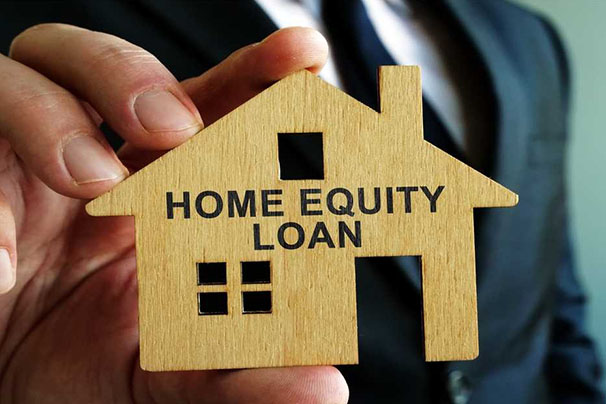What is a home equity loan? Home equity loans are a popular choice for homeowners who want to tackle home improvement projects. You can use the funds however you like, but it’s a good idea to prioritize expenses that can increase your home’s value, like renovations.

However, since your home is the collateral for the loan, it’s important to repay it to avoid the risk of foreclosure. If you’re thinking about getting a home equity loan, here’s some important information to keep in mind.
What is a Home Equity?
A home equity loan is a form of borrowing that enables you to take out a loan using the equity in your home as collateral. Equity represents the gap between your home’s present value and the outstanding balance on your mortgage. Home equity loans typically have fixed interest rates and are paid back over a set period of time, usually with monthly payments. These loans can be used for various purposes, such as home renovations, debt consolidation, or other major expenses.
It’s important to note that your home serves as collateral for the loan, so if you’re unable to repay it, there could be consequences, like foreclosure. It’s a good idea to shop around, compare rates and terms from different lenders, and consider your financial goals before deciding if a home loan is the right option for you.
How Does it work?
A home equity loan works by tapping into the equity you’ve built up in your home. Basically, it allows you to borrow money against the value of your home. The loan amount is determined by the difference between your home’s current value and the amount you still owe on your mortgage. Once approved, you’ll receive a lump sum of money that you can use for things like home renovations, debt consolidation, or other major expenses.
You’ll then make regular monthly payments, usually with a fixed interest rate, until the loan is fully paid off. Just keep in mind that if you’re unable to make the payments, there could be consequences, like foreclosure. It’s important to carefully consider your financial situation and goals before deciding if a home equity loan is the right choice for you.
Why Apply?
A home equity loan can serve multiple purposes. Some common uses include home renovations or improvements, debt consolidation, paying for education expenses, covering medical bills, or even starting a business.
The flexibility of a home equity loan allows you to use the funds for whatever you need, within reason. It’s important to use the loan responsibly and consider your financial goals when deciding how to use the funds.
Home Equity Loan Requirement
The requirements for a home equity loan can vary depending on the lender, but here are some common ones you might come across:
Sufficient Equity
Typically, lenders require that you have a certain amount of equity built up in your home. This is usually expressed as a percentage, such as an 80% loan-to-value (LTV) ratio.
Good Credit Score
Lenders will often look at your credit history and credit score to assess your creditworthiness. Higher credits score can increase your chances of getting approved and may even help you secure a lower interest rate.
Stable income
Lenders want to ensure that you have a steady source of income to make the loan payments. They may ask for proof of employment, income statements, or tax returns.
Debt-to-income ratio
Lenders also consider your debt-to-income ratio, which is the percentage of your monthly income that goes towards debt payments. They want to see that you have enough income to cover your existing debts and the new loan.
Property Appraisal
The lender might request a professional property appraisal to assess its present market value. Remember, these are just general requirements, and each lender may have their own specific criteria. It’s always a good idea to shop around and compare offers from different lenders to find the best fit for your needs.
How To Get A Home Equity Loan
The qualifications for a home equity loan are typically similar among different banks and credit unions. Generally, lenders will look for a sufficient amount of equity in your home, a good credit score, and a low debt-to-income ratio. Before you begin the application process, it’s important to take into account the following factors:
Check Your Equity
Determine how much equity you have in your home by subtracting your outstanding mortgage balance from the current market value of your property.
Research Lenders
Shop around and compare different lenders to find the best terms and rates for your home equity loan. Take into account factors such as interest rates, fees, and customer reviews.
Gather Documentation
Prepare the necessary documents, such as proof of income, employment verification, tax returns, and property information. Lenders will typically require these documents during the loan application process.
Apply For the Loan
Submit your application to the chosen lender. You may be required to fill out an application form and provide the necessary documentation.
Get an appraisal
The lender may require an appraisal of your property to determine its current market value. This step helps them assess the loan amount they can offer.
Wait for Approval
The lender will review your application, credit history, and property appraisal to make a decision. This procedure may require some time, so exercise patience.
Close the Loan
Upon approval, you will be provided with loan terms and closing documents. Review them carefully, sign the necessary paperwork, and complete the closing process.
Remember, these steps are a general guide, and the specific process may vary depending on the lender you choose. It’s always a good idea to consult with a professional or reach out to lenders directly for more personalized guidance.
Advantages and Disadvantages Home Equity Loans
It’s crucial to carefully evaluate the advantages and disadvantages of a home equity loan, as using your home as collateral comes with significant risks. Take the necessary time to carefully assess your options and make an informed decision.
Advantages
Let’s talk about the advantages of a home equity loan! Here are a few key benefits:
Lower interest Rates
Home equity loans frequently feature lower interest rates in comparison to alternative loan types, such as personal loans or credit cards. This can potentially save you money on interest payments over time.
Potential Tax Benefits
In certain instances, the interest paid on a home equity loan could be eligible for tax deductions. It is advisable to seek advice from a tax professional to understand your individual circumstances.
Access to a large Amount of Money
With a home equity loan, you can typically borrow a substantial amount of money based on the equity you have in your home. This can be useful for major expenses like home renovations, education, or debt consolidation.
Flexible use of Funds
Unlike some other loans that have specific restrictions on how you can use the funds, a home equity loan allows you to use the money for a variety of purposes. It gives you the flexibility to address your financial needs.
Remember, these advantages may vary depending on your individual circumstances and the terms of the loan. It’s always a good idea to carefully consider your financial situation and consult with a financial advisor or lender to determine if a home loan is the right choice for you.
Disadvantages
When contemplating a home equity loan, it’s crucial to be mindful of potential drawbacks.
Risk of losing your home
A home equity loan utilizes your home as collateral. If you are unable to make the loan payments, there is a risk of foreclosure, which could result in the loss of your home.
Additional fees and costs
Like any loan, a home equity loan may come with fees, such as origination fees, appraisal fees, and closing costs. These additional expenses can add up and should be factored into your decision
Tied up Equity
Taking out a home equity loan means reducing the equity you have in your home. This may limit your ability to borrow against your home in the future or sell it for a profit.
Variable interest rates
While some home equity loans may offer fixed interest rates, others may have variable rates that can increase over time. This can result in elevated monthly payments and potentially higher overall interest payments throughout the loan’s duration.
It’s important to carefully consider these potential drawbacks and assess your financial situation before deciding if a home equity loan is right for you. It’s always a good idea to consult with a financial advisor or lender to fully understand the implications and risks involved.
FAQs
Here are some of the most frequently asked questions with answers.
How much can I borrow?
The amount you can borrow depends on the equity you have in your home. Typically, lenders allow you to borrow up to 80-90% of your home’s appraised value, minus any outstanding mortgage balance.
What Are the Risks of a Home Equity Loan?
One risk is that if you fail to make payments, you could potentially lose your home. Additionally, taking on more debt with a home equity loan could put you in a financially vulnerable position if you’re unable to make the payments.



